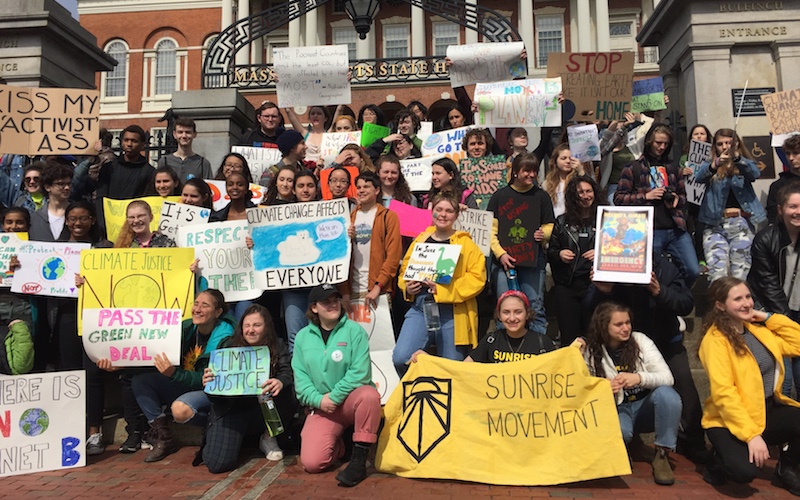
Youth around the world have been pushing for more action, both in the streets and in the courts. Pictured, a 2019 march in Boston. Photo Credit: Bethany Kwoka
In June, the state of Hawai’i agreed to cut carbon emissions in a historic climate case settlement. This is a big win — not just for the Hawaiian youth who brought the lawsuit but also for communities here in New England and beyond.
By now, it is no secret that we need to reduce our carbon pollution drastically. Carbon (or CO2) is released when we burn coal, oil, and gas. Scientists call it a “greenhouse gas,” meaning it causes the Earth to overheat. Decades of carbon pollution are largely responsible for the catastrophic climate change facing us now. Many of us already feel the effects of climate change. In New England, extreme precipitation events have increased by 60% since the 1950s, our coastal communities are being flooded from sea level rise, and (as recent weeks have clearly shown) temperatures are shooting upwards.
This is all bad enough, but for young people like myself, the true danger lies in our future: intense storms, heavy flooding, and unbearable temperatures are only expected to increase, threatening our infrastructure, ecosystems, and livelihoods.
Facing these facts, young environmental activists have brought suits against state and federal governments for failing to limit carbon pollution. The recent settlement arising from Navahine v. Hawai’i Department of Transportation is one such case, providing hope for a savvy litigation strategy and climate progress possible back home.
Hawaiian Youth Challenge Their Government:
In 2022, 13 young people filed a suit against the Hawai’i Department of Transportation, the governor, and the state government. With legal assistance from nonprofit environmental groups like Our Children’s Trust and Earthjustice, the youth argued that the state violated their constitutional right to a “clean and healthful environment” by operating transportation projects that cause heavy carbon pollution.
After a judge denied the state’s motion to dismiss the case, the state finally agreed to reduce its pollution. Under the agreement, the state pledged to completely cut all carbon emissions from ground transportation and interisland sea and air transportation by 2045. Notably, the state also created a volunteer youth council to advise the government on climate commitments in the years to come.
What Does this Mean for New England?
The Navahine settlement marks the first time a state has directly recognized that the transportation sector’s carbon pollution violates constitutional rights. While the Hawaiian youth based their argument around an environmental clause specific to their state constitution, multiple other states (including Massachusetts) have similar language that could open the door to similar litigation in the future.
The Navahine resolution also provides strong support for another youth-led climate case regarding the federal constitution, Juliana v. United States. For the past nine years, 21 young Americans supported by Our Children’s Trust have been suing the federal government for knowingly allowing pollution that contributes to the planet’s overheating. In March of this year, CLF submitted an Amicus (“friend of the court”) brief supporting the youth plaintiffs.
Recently, the Ninth Circuit ordered the District Court to dismiss Juliana, preventing the case from going to trial. In June, CLF signed onto another amicus brief supporting a petition for rehearing in hopes of encouraging the court to reconsider. With the fate of this critical case pending, the Navahine decision adds to the growing recognition of right-based climate protection for youth, providing increased pressure and momentum for continued consideration of the Juliana case.
Beyond litigation, the pollution reduction plans crafted as part of the Navahine settlement can help provide a roadmap for progress in cities in New England and beyond. As we work to make our own transportation systems—and societies at large—more environmentally friendly, we can and should learn from each other’s successes.
The Youth Will Lead the Way
The youth of the Navahine and Juliana cases are moving the needle on climate activism and litigation. They remind us that a safe and healthy future is a right for us all, and they will not sit back and let that be taken away. We shouldn’t either.
Get Involved:
- Head to CLF Action Center for quick ways you can support CLF as we sue industry bad actors over their knowledge and lack of action on climate change and work to hold the government accountable for failing to perform their duties.
- Contact your elected representatives and demand strong and rapid cuts to carbon pollution.
- Support the #savejuliana_campaign to show your support for continued consideration of the Juliana case.
- Keep track of additional ongoing climate litigation.
Claire Holding is a student at Amherst College. She was a Strategic Litigation intern at Conservation Law Foundation in the summer of 2024.



